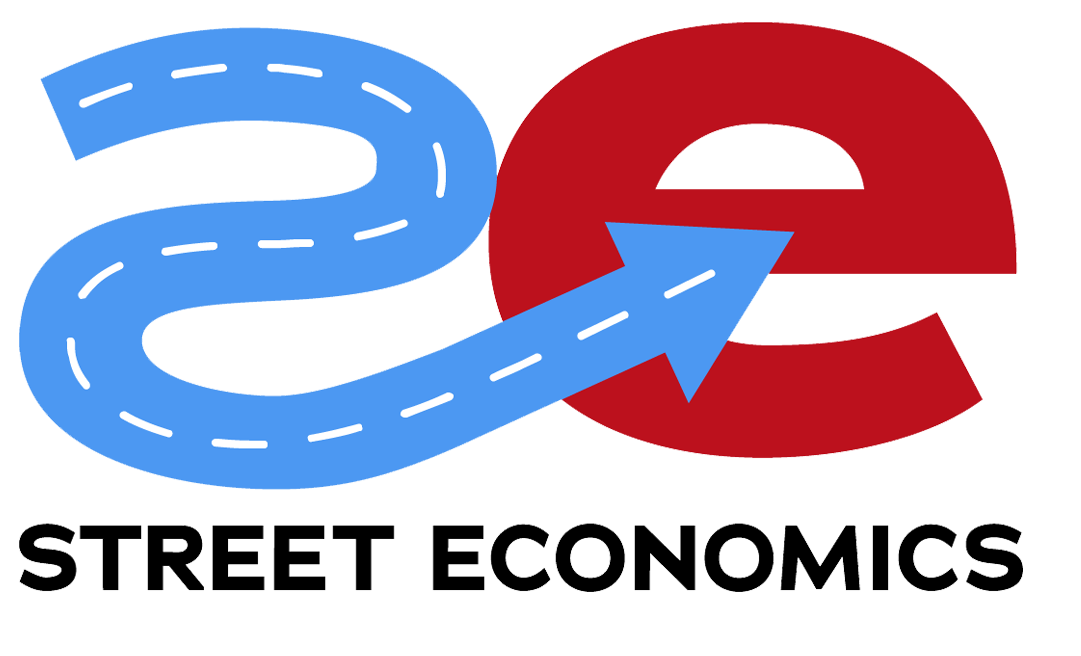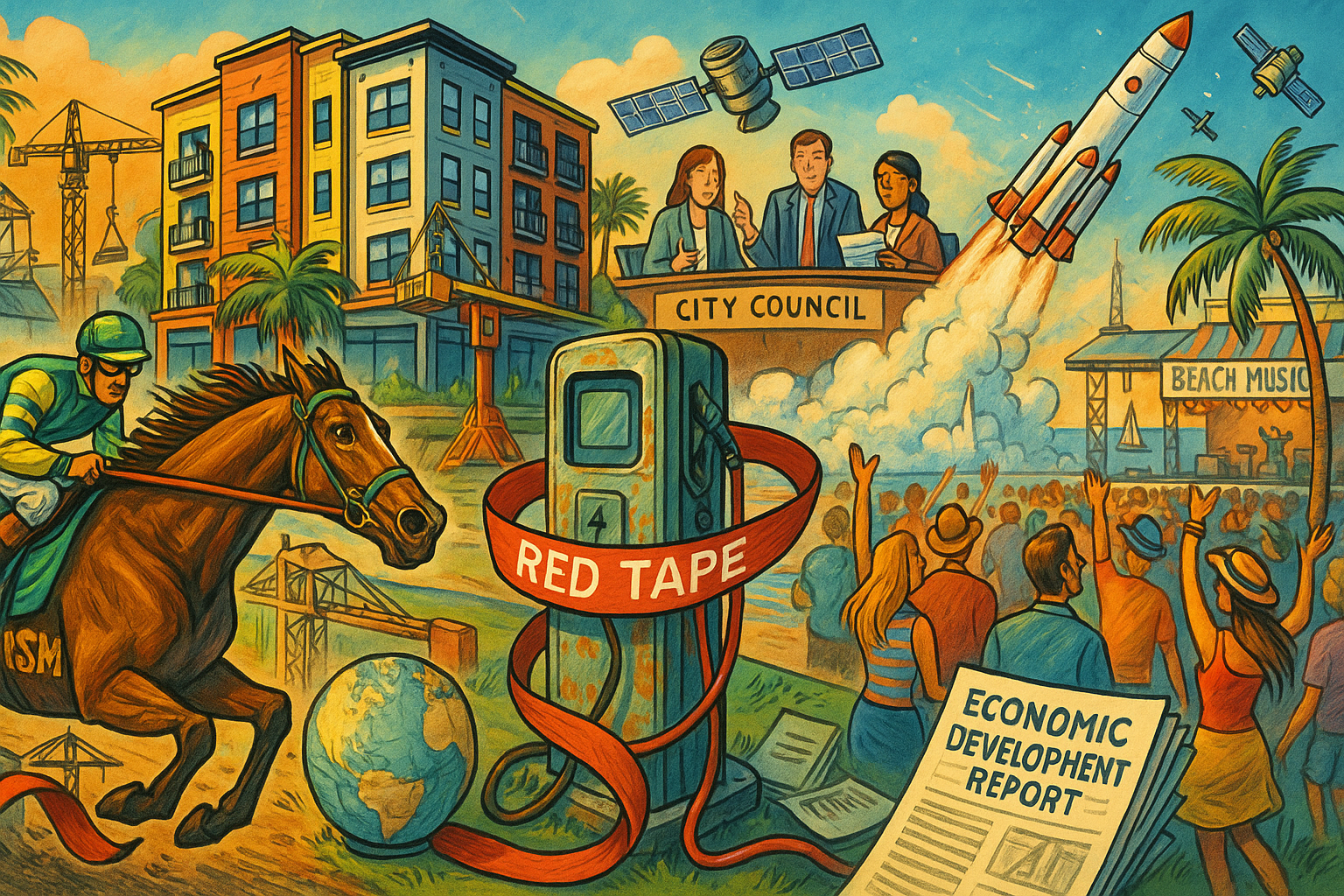BusinessFlare Take
America’s quiet millionaires are making boring money. Instead of chasing the latest app or crypto craze, they’re getting rich in unsexy businesses like ripping up old carpets and flipping burgers. The Wall Street Journal profiled these “stealthy wealthy” entrepreneurs whose fortunes come from everyday goods and services. Derek Olson, for example, made a killing manufacturing machines that tear out school carpeting – hardly glamorous, but it puts him in the 1% income bracket. Economists note that while Silicon Valley startups grab headlines, it’s traditional family businesses and regional companies quietly raking in the real money across the U.S.. In other words, the road to riches might just be paved with cup holders and carpet glue, not clickbait and IPOs.
Street Economics Insight
A Florida op-ed sounded the alarm that U.S. ports are getting smoked by global rivals. America’s busiest ports don’t even crack the world’s top 25 for efficiency – China’s mega-ports turn ships around in less than half the time. While Los Angeles and Long Beach are still slogging, places like Shanghai and Singapore have automated almost everything. The piece argues Florida could be the tortoise to catch the hare: with its strategic location and recent upgrades, ports like Port Everglades, Port of Tampa Bay, and Jacksonville Port Authority (JAXPORT) are primed to leap ahead. The catch? Embracing automation and AI-managed logistics as a catalyst. It means fewer longshoremen and more robots, a trade-off bound to rile unions, but the payoff would be faster, cheaper trade. Higher productivity at ports would lower consumer prices and even claw back some global supply chain leverage. Florida’s message to the nation: wake up and invest, or keep watching the ships sail by.
Drama Meter Reading
Local government shenanigans hit a new high (or low) in San Bernardino, California. A faction of the city council held two surprise closed-door meetings to rush the hiring of a new city manager – conveniently excluding the mayor and three council members. They literally held the “special” meetings on a Friday night and Sunday, off-site, without telling the full council. Residents were furious, packing the next meeting to accuse officials of deliberately sidelining their elected reps. “This approach lacks transparency, fairness and accountability,” one outraged local told the council, noting the obvious bias in choosing a city manager without all eight officials present. The council majority’s excuse? They wanted to speed things up. The result? Eroded trust, threats of legal liability, and a big Drama Meter spike in San Bernardino’s city hall. Nice work, folks. 8 out of 10 on the Drama Meter!
Book Drop
California’s aggressive EV mandate is running head-first into reality – just as warned in Red Tape Empire. Starting with 2026 models, 35% of all new cars sold in California must be “zero-emission”. The auto industry’s response: are you kidding? A top Toyota Motor Corporation executive bluntly called California’s mandate “impossible” to meet on that timetable. The demand isn’t there – nationally, EVs are only ~9% of new sales, and even in eco-conscious California EVs are about 27%, nowhere near the mandate levels. No other state is close, either. For automakers, the mandate means huge market distortions: they’d have to flood California (and the dozen follower states) with electric models while selling gas cars elsewhere, an “unnatural act” that could wreak havoc on production and pricing. This is exactly the kind of overreaching rule-by-bureaucrats that Red Tape Empire skewers – when political edicts crash into economic limits. You can’t just mandate consumer behavior by fiat without consequences. As one industry insider put it, California’s EV zealots may soon force automakers into a choice of breaking the rules or breaking their business.
ECOSINT Signal
Drug traffickers have taken their business underwater – literally. A near-record number of “narco-sub” smuggling vessels were intercepted across the Atlantic and Pacific in the past year. These aren’t James Bond-style submarines, but DIY low-profile boats built in the jungle to evade radar and the U.S. Coast Guard. And they’re no longer just running cocaine up the Central American coast. Authorities caught one packed with 6.5 tons of coke near the Azores off Europe, another abandoned on a beach in West Africa, and yet another headed toward Australia. In other words, narco-subs have gone global. InSight Crime reports that traffickers are churning out more of these semi-submersibles, adapting designs with lead heat-shields and outboard motors to avoid detection. They’re surprisingly cheap, about $150,000 to build – peanuts for a cartel. It’s a logistics innovation born of necessity: when roads and ports are watched, you build a coke submarine. The result is a new global cocaine route network under the waves, from the Andes to Africa and beyond. Coast guards of the world, good luck – you’re gonna need a bigger sonar.
Red River Flavor
The food industry’s chemical fiesta is getting kicked out of school cafeterias – at least in Utah. Governor Spencer Cox signed a law banning a list of artificial additives from all public school meals. Say goodbye to Red Dye No. 3, Yellow No. 5, Blue No. 1 & 2, and a bunch of other lab-concocted “ingredients” that have been staples of processed school food. Also on the blacklist: potassium bromate (a dough conditioner linked to cancer) and propylparaben (a preservative). In a sane world the FDA would have done this ages ago, but welcome to America, where states have to step up. School nutrition officials admit this will make menu planning “difficult,” since so many mass-produced foods are loaded with these additives. (Perhaps that’s a clue about what we’ve been feeding kids.) Utah’s move follows several other states starting to clamp down on food dyes that Europe banned long ago. It’s a small win for healthy eating and a big middle finger to the FDA/pharma/food complex that insisted all this garbage was “generally recognized as safe.”
The Music Cities
Who says beach towns can’t rock? Ocean City, Maryland – better known for boardwalk fries and summer tourists – is launching its first-ever Boardwalk Rock Festival. The two-day music fest hit the sand this weekend with an “epic lineup of rock’s biggest names” (their words) to jumpstart the season. It’s brought to you by the same folks behind the successful Oceans Calling country music festival, so the city is hoping for a similar boost in hotel bookings and off-season cred. Tickets aren’t cheap (up to $3,950 for an ultimate VIP package – someone has money to burn), but local businesses are salivating at the thought of thousands of rock fans spending freely on crabcakes and beer. Ocean City officials have been looking for ways to extend the tourist season, and a mid-May rock bash might do the trick. Nothing stimulates a local economy like guitar riffs on the beach, apparently. We’ll see if Boardwalk Rock becomes an annual institution or just a one-hit wonder.
Space Economy Signal
While Washington bureaucrats hold endless meetings about the “space race,” China is just racing – and leaving the U.S. in its contrail. Case in point: China launched 12 AI-powered satellites in a single rocket as part of a plan to create the world’s first orbital supercomputer. It’s called the “Three-Body” constellation (yes, named after that sci-fi novel), and the network will use laser links between satellites to process data in space at a projected 1,000+ peta-operations per second. In plain English: they’re building a massive cloud computer in orbit. The idea is to reduce reliance on Earth-based servers and cut the energy needed to beam zillions of bytes back and forth. Ambitious? Absolutely. This also hints at military dual-use (think sky-based AI crunching reconnaissance data in real time). Meanwhile, the U.S. can barely get its act together on funding next-gen GPS or securing launchpads. The message is clear: the space economy is Beijing’s to lose if others don’t wake up. You snooze, you lose… in space.
Purple Cow of the Day
Journalism is not dead – it just won the Preakness. In a delightful twist, a racehorse named Journalism came from behind to win the 150th Preakness Stakes in Baltimore. After finishing second in the Kentucky Derby, Journalism surged down the stretch at Pimlico, proving that sometimes truth (or at least a horse named after it) prevails. The odds-on favorite nearly got boxed out, but recovered and burst through to victory, making its Italian jockey the first from his country to win a Triple Crown race. Given the state of the news industry, we’ll take this as a win. Who knew 2025’s big journalism triumph would happen on a racetrack? Perhaps the only place left where Journalism still makes money is at the betting window.
About Street Economics Daily
Street Economics provides meaningful economic insights without overwhelming you with academic and technical jargon. We focus on the reality and potential of every place, delivering daily intelligence on economic trends affecting communities, regions, and industries. Our approach emphasizes what’s actually happening on the ground rather than theoretical models, giving you the actionable insights you need to make informed decisions. To learn more visit www.streeteconomics.ai
BusinessFlare | Street Economics | Drama Meter | The Music Cities | Goodnight’s Red River



Comments are closed